out_of_的用法小结
out of的用法总结

Out of 的用法总结Out of 是一个常用的介词短语,有很多有趣的用法和意义。
本文将对其进行总结和分析,帮助大家更好地理解和使用它。
下面是本店铺为大家精心编写的3篇《Out of 的用法总结》,供大家借鉴与参考,希望对大家有所帮助。
《Out of 的用法总结》篇1Out of 是一个常见的介词短语,常常出现在英语的口语和书面语中。
它有很多不同的用法和意义,下面我们将对其进行总结和分析。
1. 表示“不在……之中”Out of 最常见的用法是表示“不在……之中”。
例如:- I"m out of milk. (我没有牛奶了。
)- She was out of the room when the phone rang. (当电话响的时候,她不在房间里。
)2. 表示“从……出来”Out of 还可以表示“从……出来”。
例如:- I came out of the bathroom. (我从浴室出来了。
)- The dog went out of the house. (狗离开了房子。
)3. 表示“超过……范围”Out of 还可以表示“超过……范围”。
例如:- The temperature is out of control. (温度失控了。
)- The dog is out of bounds. (这只狗已经超出了范围。
)4. 表示“缺少”Out of 还可以表示“缺少”。
例如:- We are out of bread. (我们没有面包了。
)- She is out of patience. (她已经失去了耐心。
)5. 表示“起源于……”Out of 还可以表示“起源于……”。
例如:- The river flows out of the mountains. (这条河流源于山脉。
)- The fire started out of nowhere. (这场火不知从何而起。
)6. 表示“由……组成”Out of 还可以表示“由……组成”。
out of 的用法总结
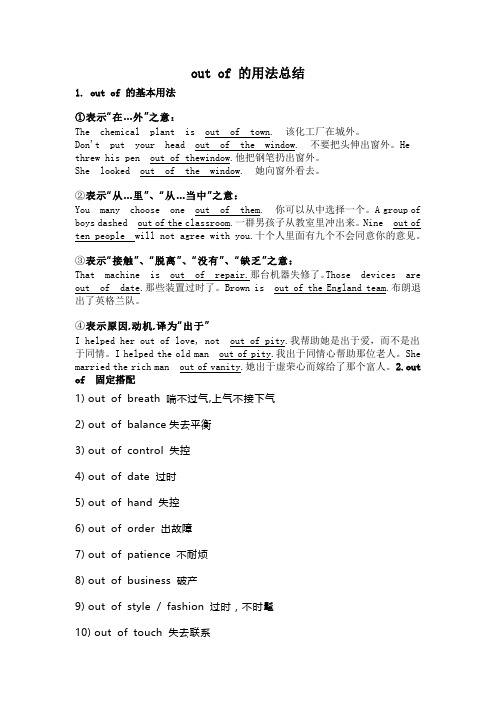
out of 的用法总结1. out of 的基本用法①表示“在…外”之意:The chemical plant is out of town. 该化工厂在城外。
Don't put your head out of the window. 不要把头伸出窗外。
He threw his pen out of thewindow.他把钢笔扔出窗外。
She looked out of the window. 她向窗外看去。
②表示“从…里”、“从…当中”之意:You many choose one out of them. 你可以从中选择一个。
A group of boys dashed out of the classroom.一群男孩子从教室里冲出来。
Nine out of ten people will not agree with you.十个人里面有九个不会同意你的意见。
③表示“接触”、“脱离”、“没有”、“缺乏”之意:That machine is out of repair.那台机器失修了。
Those devices are out of date.那些装置过时了。
Brown is out of the England team.布朗退出了英格兰队。
④表示原因,动机,译为“出于”I helped her out of love, not out of pity.我帮助她是出于爱,而不是出于同情。
I helped the old man out of pity.我出于同情心帮助那位老人。
She married the rich man out of vanity.她出于虚荣心而嫁给了那个富人。
2.out of 固定搭配1) out of breath 喘不过气,上气不接下气2) out of balance失去平衡3) out of control 失控4) out of date 过时5) out of hand 失控6) out of order 出故障7) out of patience 不耐烦8) out of business 破产9) out of style / fashion 过时,不时髦10) out of touch 失去联系11) out of question 毫无疑问..12) out of repair 失修13) out of shape 变形14) out of danger 脱离危险15) out of trouble 摆脱麻烦16) out of (one’s) reach 够不着。
英语中 out of 的用法
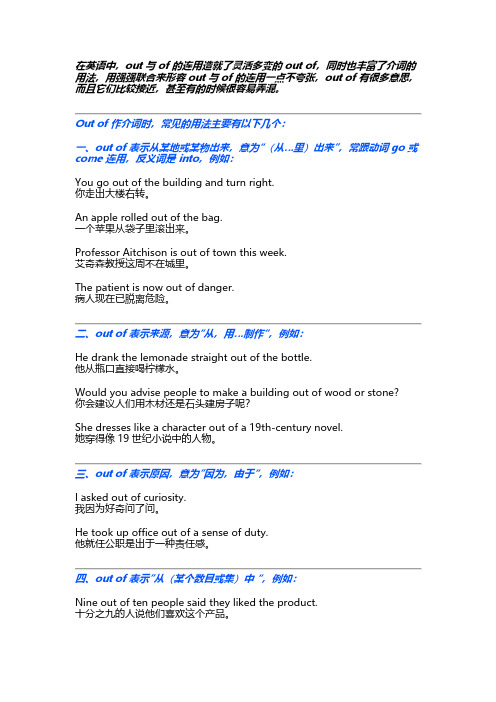
在英语中,out 与 of 的连用造就了灵活多变的 out of,同时也丰富了介词的用法,用强强联合来形容 out 与 of 的连用一点不夸张,out of 有很多意思,而且它们比较接近,甚至有的时候很容易弄混。
Out of 作介词时,常见的用法主要有以下几个:一、out of 表示从某地或某物出来,意为“(从…里)出来”,常跟动词 go 或come 连用,反义词是 into,例如:You go out of the building and turn right.你走出大楼右转。
An apple rolled out of the bag.一个苹果从袋子里滚出来。
Professor Aitchison is out of town this week.艾奇森教授这周不在城里。
The patient is now out of danger.病人现在已脱离危险。
二、out of 表示来源,意为“从,用…制作“,例如:He drank the lemonade straight out of the bottle.他从瓶口直接喝柠檬水。
Would you advise people to make a building out of wood or stone?你会建议人们用木材还是石头建房子呢?She dresses like a character out of a 19th-century novel.她穿得像19世纪小说中的人物。
三、out of 表示原因,意为”因为,由于“,例如:I asked out of curiosity.我因为好奇问了问。
He took up office out of a sense of duty.他就任公职是出于一种责任感。
四、out of 表示”从(某个数目或集)中“,例如:Nine out of ten people said they liked the product.十分之九的人说他们喜欢这个产品。
一、out of的基本用法教学提纲

一、o u t o f的基本用法一、out of的基本用法Ⅰ.表示“在……外”之意:1. The chemical plant is out of town.该化工厂在城外。
2. Our factory is 4 miles out of the city. 我厂离城4英里。
(指在城外,离城4英里。
)Ⅱ.表示“从……里”、“从……当中”之意: 1. We should remove the machine out of the room.我们应该把这台记起从室内搬出去。
2. Pump as much air as possible out of the container. 尽可能地把容器内的空气都抽走。
3. You many choose one out of them. 你可以从中选择一个。
4. This is only one instance out of many.这只不过是许多例子中的一例而已。
Ⅲ.表示“接触”、“脱离”、“没有”、“缺乏”之意:1. They have got out of many difficulties.他们已摆脱了许多困难。
2. The instrument went out of order.这个仪表发生故障。
3. That machine is out of repair.那台机器失修了(或损坏了)。
4. Those devices are out of date.那些装置过时了。
5. They were often out of spare parts before liberation.解放前他们常缺少备件。
6. It is out of comparison.这是无可比拟的。
7. A new method was introduced are old one naturally.采用了新方法,旧方法自然就淘汰了。
8. Their workshop has run out of oxygen.他们的车间已用完氧气。
out of的基本用法 (2)
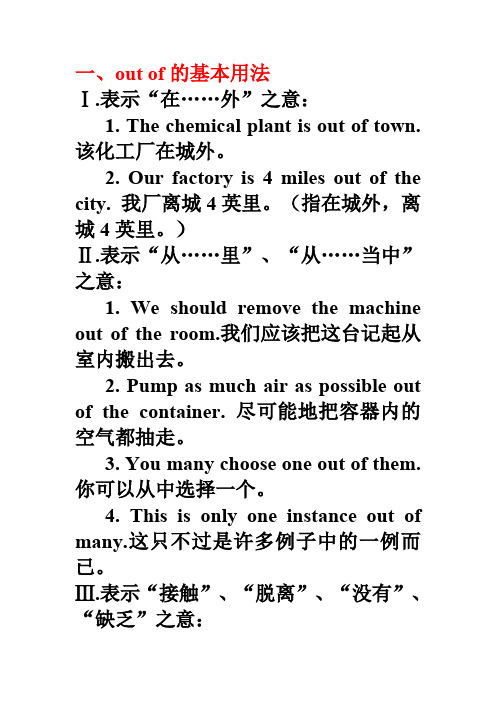
一、out of的基本用法Ⅰ.表示“在……外”之意:1. The chemical plant is out of town. 该化工厂在城外。
2. Our factory is 4 miles out of the city. 我厂离城4英里。
(指在城外,离城4英里。
)Ⅱ.表示“从……里”、“从……当中”之意:1. We should remove the machine out of the room.我们应该把这台记起从室内搬出去。
2. Pump as much air as possible out of the container. 尽可能地把容器内的空气都抽走。
3. You many choose one out of them. 你可以从中选择一个。
4. This is only one instance out of many.这只不过是许多例子中的一例而已。
Ⅲ.表示“接触”、“脱离”、“没有”、“缺乏”之意:1. They have got out of many difficulties.他们已摆脱了许多困难。
2. The instrument went out of order.这个仪表发生故障。
3. That machine is out of repair.那台机器失修了(或损坏了)。
4. Those devices are out of date.那些装置过时了。
5. They were often out of spare parts before liberation.解放前他们常缺少备件。
6. It is out of comparison.这是无可比拟的。
7. A new method was introduced are old one naturally.采用了新方法,旧方法自然就淘汰了。
8. Their workshop has run out of oxygen.他们的车间已用完氧气。
介词 out of 和outside 的用法_介词 英语语法.doc
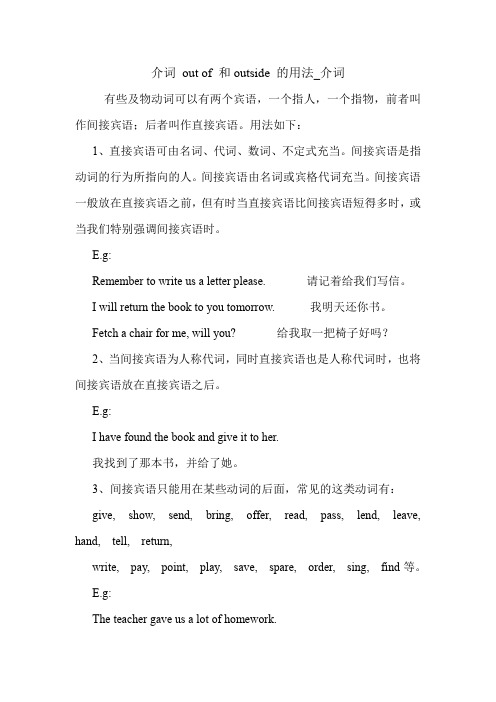
介词out of 和outside 的用法_介词有些及物动词可以有两个宾语,一个指人,一个指物,前者叫作间接宾语;后者叫作直接宾语。
用法如下:1、直接宾语可由名词、代词、数词、不定式充当。
间接宾语是指动词的行为所指向的人。
间接宾语由名词或宾格代词充当。
间接宾语一般放在直接宾语之前,但有时当直接宾语比间接宾语短得多时,或当我们特别强调间接宾语时。
E.g:Remember to write us a letter please. 请记着给我们写信。
I will return the book to you tomorrow. 我明天还你书。
Fetch a chair for me, will you? 给我取一把椅子好吗?2、当间接宾语为人称代词,同时直接宾语也是人称代词时,也将间接宾语放在直接宾语之后。
E.g:I have found the book and give it to her.我找到了那本书,并给了她。
3、间接宾语只能用在某些动词的后面,常见的这类动词有:give, show, send, bring, offer, read, pass, lend, leave, hand, tell, return,write, pay, point, play, save, spare, order, sing, find等。
E.g:The teacher gave us a lot of homework.= The teacher gave a lot of homework to us.老师留给我们很多作业。
He bought flowers for his girlfriend.out of 和outside 的用法1. out of:l)从(出来):He got out of his car.他走下车来。
Is she out of hospital yet?她出院了吗?She brought something out of her bag.她从口袋里拿出一样东西。
一、out of的基本用法
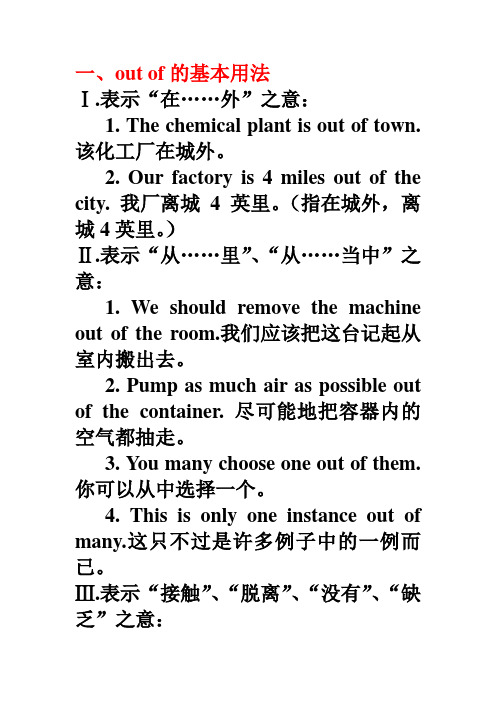
一、out of的基本用法Ⅰ.表示“在……外”之意:1. The chemical plant is out of town. 该化工厂在城外。
2. Our factory is 4 miles out of the city. 我厂离城4英里。
(指在城外,离城4英里。
)Ⅱ.表示“从……里”、“从……当中”之意:1. We should remove the machine out of the room.我们应该把这台记起从室内搬出去。
2. Pump as much air as possible out of the container. 尽可能地把容器内的空气都抽走。
3. You many choose one out of them. 你可以从中选择一个。
4. This is only one instance out of many.这只不过是许多例子中的一例而已。
Ⅲ.表示“接触”、“脱离”、“没有”、“缺乏”之意:1. They have got out of many difficulties.他们已摆脱了许多困难。
2. The instrument went out of order.这个仪表发生故障。
3. That machine is out of repair.那台机器失修了(或损坏了)。
4. Those devices are out of date.那些装置过时了。
5. They were often out of spare parts before liberation.解放前他们常缺少备件。
6. It is out of comparison.这是无可比拟的。
7. A new method was introduced are old one naturally.采用了新方法,旧方法自然就淘汰了。
8. Their workshop has run out of oxygen.他们的车间已用完氧气。
英语 out of place 的用法
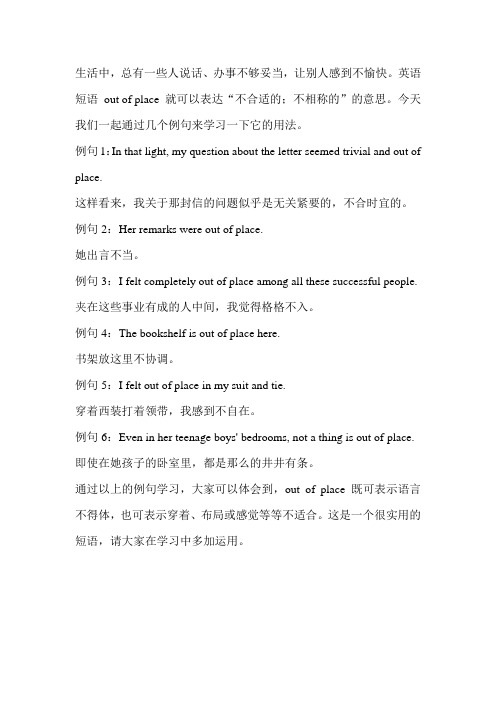
生活中,总有一些人说话、办事不够妥当,让别人感到不愉快。
英语短语out of place 就可以表达“不合适的;不相称的”的意思。
今天我们一起通过几个例句来学习一下它的用法。
例句1:In that light, my question about the letter seemed trivial and out of place.
这样看来,我关于那封信的问题似乎是无关紧要的,不合时宜的。
例句2:Her remarks were out of place.
她出言不当。
例句3:I felt completely out of place among all these successful people. 夹在这些事业有成的人中间,我觉得格格不入。
例句4:The bookshelf is out of place here.
书架放这里不协调。
例句5:I felt out of place in my suit and tie.
穿着西装打着领带,我感到不自在。
例句6:Even in her teenage boys' bedrooms, not a thing is out of place. 即使在她孩子的卧室里,都是那么的井井有条。
通过以上的例句学习,大家可以体会到,out of place 既可表示语言不得体,也可表示穿着、布局或感觉等等不适合。
这是一个很实用的短语,请大家在学习中多加运用。
介词out of的用法详解

介词"out of"在英语中有着多种用法,主要取决于其后面的名词或动词。
以下是一些常见的用法:1. "Out of"表示"由...制成":这种用法通常出现在"be made out of"或"be made from"的结构中,用于描述某物体的材料成分。
例如:"This chair is made out of wood."(这把椅子是由木头制成的。
)2. "Out of"表示"出于...的":这种用法通常出现在"be out of"的结构中,用于描述某物来自于某个地方或群体。
例如:"He is out of New York."(他来自纽约。
)3. "Out of"表示"由于...的":这种用法通常出现在"be out of"的结构中,用于描述某物是由某种原因造成的。
例如:"The accident was out of carelessness."(这场事故是由于粗心大意造成的。
)4. "Out of"表示"在...之外":这种用法通常出现在"be out of"的结构中,用于描述某物在某个范围或区域之外。
例如:"The house is out of the city limits."(这所房子在市区范围之外。
)5. "Out of"表示"出于...的":这种用法通常出现在"be out of"的结构中,用于描述某物是由某种动机或原因引起的。
例如:"He did it out of curiosity."(他这么做是出于好奇。
英语中介词-out-of-和outside-的用法
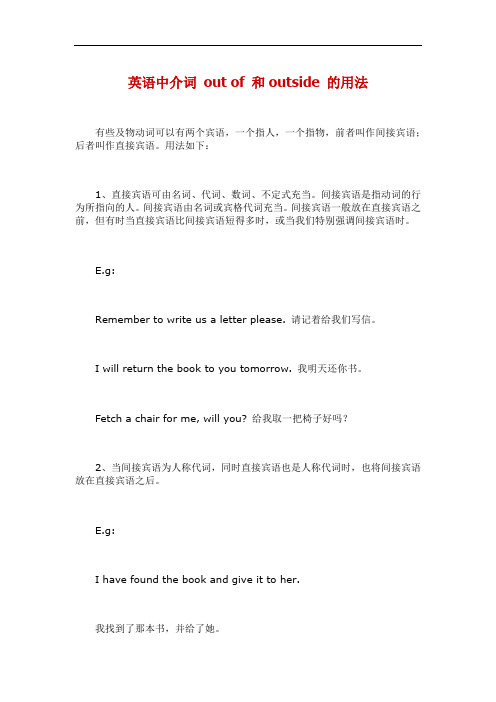
英语中介词out of 和outside 的用法有些及物动词可以有两个宾语,一个指人,一个指物,前者叫作间接宾语;后者叫作直接宾语。
用法如下:1、直接宾语可由名词、代词、数词、不定式充当。
间接宾语是指动词的行为所指向的人。
间接宾语由名词或宾格代词充当。
间接宾语一般放在直接宾语之前,但有时当直接宾语比间接宾语短得多时,或当我们特别强调间接宾语时。
E.g:Remember to write us a letter please. 请记着给我们写信。
I will return the book to you tomorrow. 我明天还你书。
Fetch a chair for me, will you? 给我取一把椅子好吗?2、当间接宾语为人称代词,同时直接宾语也是人称代词时,也将间接宾语放在直接宾语之后。
E.g:I have found the book and give it to her.我找到了那本书,并给了她。
3、间接宾语只能用在某些动词的后面,常见的这类动词有:give, show, send, bring, offer, read, pass, lend, leave, hand, tell, return,write, pay, point, play, save, spare, order, sing, find等。
E.g:The teacher gave us a lot of homework.= The teacher gave a lot of homework to us.老师留给我们很多作业。
He bought flowers for his girlfriend.out of 和outside 的用法1. out of:l)从……(出来):He got out of his car.他走下车来。
Is she out of hospital yet?她出院了吗?She brought something out of her bag. 她从口袋里拿出一样东西。
out of which的用法
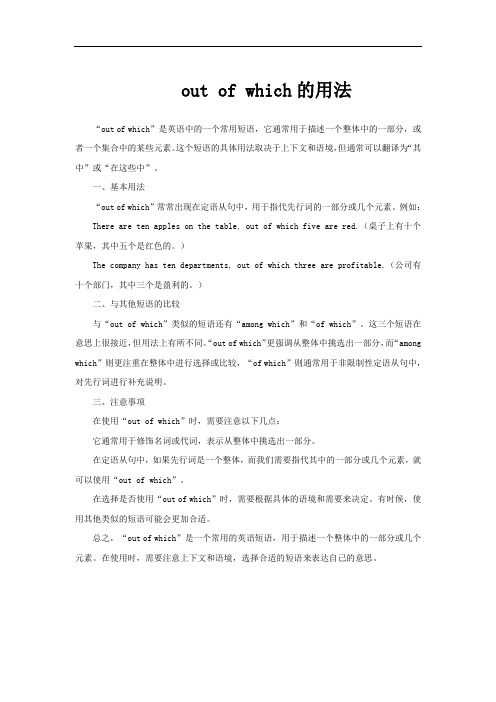
out of which的用法“out of which”是英语中的一个常用短语,它通常用于描述一个整体中的一部分,或者一个集合中的某些元素。
这个短语的具体用法取决于上下文和语境,但通常可以翻译为“其中”或“在这些中”。
一、基本用法“out of which”常常出现在定语从句中,用于指代先行词的一部分或几个元素。
例如:There are ten apples on the table, out of which five are red.(桌子上有十个苹果,其中五个是红色的。
)The company has ten departments, out of which three are profitable.(公司有十个部门,其中三个是盈利的。
)二、与其他短语的比较与“out of which”类似的短语还有“among which”和“of which”。
这三个短语在意思上很接近,但用法上有所不同。
“out of which”更强调从整体中挑选出一部分,而“among which”则更注重在整体中进行选择或比较,“of which”则通常用于非限制性定语从句中,对先行词进行补充说明。
三、注意事项在使用“out of which”时,需要注意以下几点:它通常用于修饰名词或代词,表示从整体中挑选出一部分。
在定语从句中,如果先行词是一个整体,而我们需要指代其中的一部分或几个元素,就可以使用“out of which”。
在选择是否使用“out of which”时,需要根据具体的语境和需要来决定。
有时候,使用其他类似的短语可能会更加合适。
总之,“out of which”是一个常用的英语短语,用于描述一个整体中的一部分或几个元素。
在使用时,需要注意上下文和语境,选择合适的短语来表达自己的意思。
get out of的用法总结
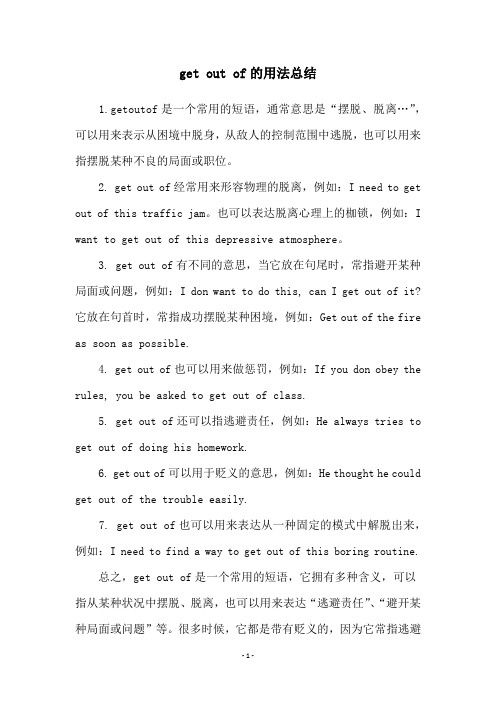
get out of的用法总结1.getoutof是一个常用的短语,通常意思是“摆脱、脱离…”,可以用来表示从困境中脱身,从敌人的控制范围中逃脱,也可以用来指摆脱某种不良的局面或职位。
2. get out of经常用来形容物理的脱离,例如:I need to get out of this traffic jam。
也可以表达脱离心理上的枷锁,例如:I want to get out of this depressive atmosphere。
3. get out of有不同的意思,当它放在句尾时,常指避开某种局面或问题,例如:I don want to do this, can I get out of it?它放在句首时,常指成功摆脱某种困境,例如:Get out of the fire as soon as possible.4. get out of也可以用来做惩罚,例如:If you don obey the rules, you be asked to get out of class.5. get out of还可以指逃避责任,例如:He always tries to get out of doing his homework.6. get out of可以用于贬义的意思,例如:He thought he could get out of the trouble easily.7. get out of也可以用来表达从一种固定的模式中解脱出来,例如:I need to find a way to get out of this boring routine.总之,get out of是一个常用的短语,它拥有多种含义,可以指从某种状况中摆脱、脱离,也可以用来表达“逃避责任”、“避开某种局面或问题”等。
很多时候,它都是带有贬义的,因为它常指逃避责任、摆脱不利的境地,但也可以用来表达从一种模式中解脱出来,摆脱困境,改变现状。
out of的用法

out of的用法
“out of”是一个常见的英语短语,其含义和用法有多种。
1. 表示“从……出来,离开”
例如:I ran out of the room when the fire alarm went off. (当火灾警报响起时,我跑出了房间。
)
2. 表示“用完,耗尽”
例如:I am out of milk, could you buy some at the store? (我没牛奶了,你能去商店买点吗)
3. 表示“由于……,不再……”
例如:He is out of work because of the pandemic. (由于疫情,他失业了。
)
4. 表示“在……之外,超出……”
例如:The price is out of my budget. (这个价格超出了我的预算。
)
5. 表示“在……之中,来自于……”
例如:She is the best student out of the whole class. (她是整个班级中最优秀的学生。
)
需要注意的是,根据上下文和语境的不同,“out of”的含义和用法也可能会有所变化。
out of的用法归纳

out of的用法归纳“out of”这个短语在英语中的用法那可真是多种多样,咱们一起来瞧瞧!首先,“out of”最常见的意思就是“从……里面出来”。
比如说,“The cat jumped out of the box”(这只猫从盒子里跳了出来。
)这里就很形象地表示了一个物体从某个空间内部移动到外部的动作。
它还能表示“缺乏,没有”。
像“He is out of patience”(他没有耐心了。
)你看,这里就不是在说具体的位置,而是说这个人的状态,耐心用光啦。
“out of”也可以用来表示“由于,因为”。
举个例子,“Out of curiosity, I opened the letter”(出于好奇,我打开了那封信。
)是不是能感觉到那种因为好奇所以做出某个举动的心情?另外,“out of”在一些情况下还能表示“在……范围之外”。
比如说,“This question is out of my ability”(这个问题超出了我的能力范围。
)就好像有个圈,而这个事儿在圈外面,咱够不着。
我记得有一次,我在公园里散步,看到一个小朋友在和他的小伙伴们玩耍。
他们在玩捉迷藏,其中一个小朋友藏得特别好,其他小伙伴找了好久都没找到。
最后,那个藏起来的小朋友自己忍不住跑了出来,大喊着:“I'm out of my hiding place!”(我从我的藏身之处出来啦!)这一幕可把大家都逗乐了。
再说说和“out of”有关的一些常见搭配。
“out of date”意思是“过时的”,“out of order”表示“出故障,不整齐”,“out of work”则是“失业”。
咱们在学习“out of”的用法时,可别死记硬背,得多读多练。
比如说,平时看到一些英语文章或者电影,留意一下里面“out of”的用法,这样就能更深刻地理解啦。
就像我之前有个学生,一开始总是搞不清楚“out of”的各种意思,做题老出错。
浅析out of的几种用法
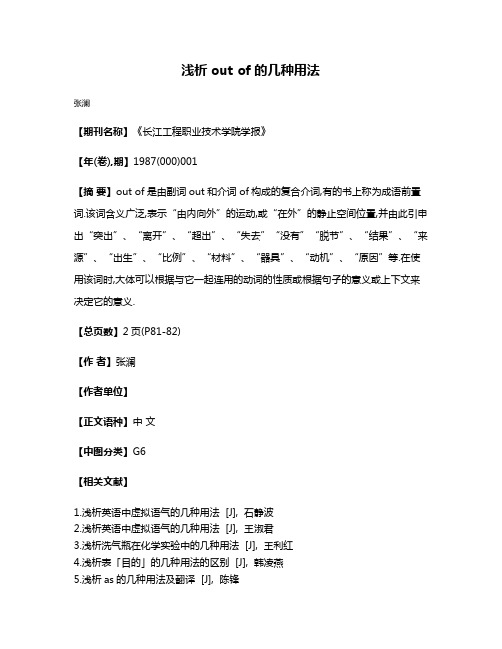
浅析out of的几种用法
张澜
【期刊名称】《长江工程职业技术学院学报》
【年(卷),期】1987(000)001
【摘要】out of是由副词out和介词of构成的复合介词,有的书上称为成语前置词.该词含义广泛,表示“由内向外”的运动,或“在外”的静止空间位置,并由此引申出“突出”、“离开”、“超出”、“失去”“没有”“脱节”、“结果”、“来源”、“出生”、“比例”、“材料”、“器具”、“动机”、“原因”等.在使用该词时,大体可以根据与它一起连用的动词的性质或根据句子的意义或上下文来决定它的意义.
【总页数】2页(P81-82)
【作者】张澜
【作者单位】
【正文语种】中文
【中图分类】G6
【相关文献】
1.浅析英语中虚拟语气的几种用法 [J], 石静波
2.浅析英语中虚拟语气的几种用法 [J], 王淑君
3.浅析洗气瓶在化学实验中的几种用法 [J], 王利红
4.浅析表「目的」的几种用法的区别 [J], 韩凌燕
5.浅析as的几种用法及翻译 [J], 陈锋
因版权原因,仅展示原文概要,查看原文内容请购买。
out of breath的用法归纳
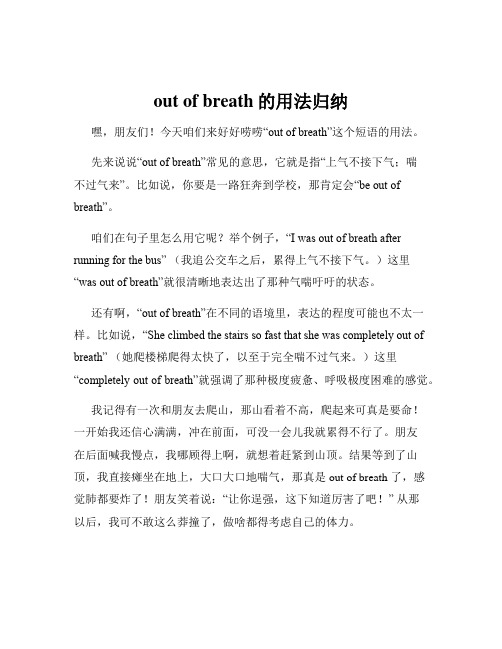
out of breath的用法归纳嘿,朋友们!今天咱们来好好唠唠“out of breath”这个短语的用法。
先来说说“out of breath”常见的意思,它就是指“上气不接下气;喘不过气来”。
比如说,你要是一路狂奔到学校,那肯定会“be out of breath”。
咱们在句子里怎么用它呢?举个例子,“I was out of breath after running for the bus” (我追公交车之后,累得上气不接下气。
)这里“was out of breath”就很清晰地表达出了那种气喘吁吁的状态。
还有啊,“out of breath”在不同的语境里,表达的程度可能也不太一样。
比如说,“She climbed the stairs so fast that she was completely out of breath” (她爬楼梯爬得太快了,以至于完全喘不过气来。
)这里“completely out of breath”就强调了那种极度疲惫、呼吸极度困难的感觉。
我记得有一次和朋友去爬山,那山看着不高,爬起来可真是要命!一开始我还信心满满,冲在前面,可没一会儿我就累得不行了。
朋友在后面喊我慢点,我哪顾得上啊,就想着赶紧到山顶。
结果等到了山顶,我直接瘫坐在地上,大口大口地喘气,那真是 out of breath 了,感觉肺都要炸了!朋友笑着说:“让你逞强,这下知道厉害了吧!” 从那以后,我可不敢这么莽撞了,做啥都得考虑自己的体力。
再来说说它的变形。
有时候我们会看到“be short of breath”,其实和“out of breath”意思差不多,也是“呼吸短促;气喘”的意思。
比如说,“The patient is often short of breath” (这位病人经常气喘。
)另外,在一些口语表达中,我们还可能会听到类似“catch one's breath”这样的短语,意思是“喘口气;歇口气”。
- 1、下载文档前请自行甄别文档内容的完整性,平台不提供额外的编辑、内容补充、找答案等附加服务。
- 2、"仅部分预览"的文档,不可在线预览部分如存在完整性等问题,可反馈申请退款(可完整预览的文档不适用该条件!)。
- 3、如文档侵犯您的权益,请联系客服反馈,我们会尽快为您处理(人工客服工作时间:9:00-18:30)。
out of 的用法小结
在下列两个句子中,out of的意思截然不同:
①Is honesty going out of style?
在“难道诚实正在变得不合时宜了吗?”中,out of表示“跟不上”,“脱离”的意思
②Are these just two stories out of many?
在“这些仅是许多故事中的两个吗?”一句中,out of表示部分关系。
在短语介词中,out of表示的意思很多,其用法也颇为复杂。
灵活地、注解:in style:
流行
例句与用法:
1. Her clothes are always in style. 她的衣服总是很时髦。
2. Let's eat in style.
我们吃得考究一点吧。
3. She dresses in style.
她穿着很时髦。
4. If ever she gives a party she likes to do it in style.
她每举办舞会,总喜欢搞得很排场。
out of style: 不时髦的不时新的
例句与用法:
1. Her hat is a creation that will never go out of style; it will just look ridiculous year after year.
她的帽子是一项决不会过时的创作,只不过看上去一年比一年滑稽罢了。
2. Dresses may be in style one year and out of style the next.
服装有可能会今年时髦,而明年过时。
②Are these just two stories out of many?
有规律地掌握其用法,对学好英语大有裨益,现将其用法归纳如下:
①Fish can not live out of water.
鱼离开了水就不能活。
②This animal is not found out of certain areas in Africa.
这种动物只在非洲某些地区有。
(在非洲的某些地区之外,是没有这种动物的。
)
③This plant is situated only five miles out of the city.
那个工厂离市区仅五英里。
①As Ine pulled out of the garage,I saw the gun pointing against the car window.
当我们把车开出车库时,我看见那支枪顶住了车窗玻璃。
②They walked out of the supermarket.
他们走出了超级市场。
句型:①This will happen in nine cases out of ten.
这种情况十之八九会发生。
句型:②This is but/only one instance out of many.
那只不过是许多例子中的一个而已。
①The ship is out of sight.
船已看不见了。
②They sang out of tune.
他们唱得来了调。
句型:③This plan is out of the ordinary.
这是一个非凡的计划。
①The traffic accident was out of carelessness in divin g.
这起交通事故是由于粗心驾驶所致。
②The treatment of the topic is out of necessity much condensed.由于需要,关于这个问题的阐述已大加压缩。
①We are out of tea.
我们的茶叶用完了。
②This book is out of print.
这本书绝版了。
③That novel is out of stock.
那本小说脱销了。
①He made the box out of old planks.
他用旧木板做了箱子。
②This paragraph is out of Marx’s works in the original.
这一段引自马克思原著。
句型:①He talked his wife out of buying a new bicycle.
他说服他的妻子不要买新自行车。
②I couldn't persuade him out of the resolution.
我没能说服他改变决心。
另外,out of与其他词可以构成许多非常有用的、常见的固定词组,这些词组有:
out of accord with(与……不一致;同……不协调),
out of action(失去作用,停止运动),
out of all relation to(和……毫无关系),
out of balance (失去平衡),
out of breath(上气不接下气),
out of character(不相称,不适当),
out of control(失去控制),
out of date(过时),
out of doubt(确定无疑),
out of fashion(不合于时尚),
out of gear(脱节,失调),
out of harmony(不和谐),
out of kindness(出于好意),
out of necessity(出于必要)
,out of order(不整齐,次序颠倒)
,out of one's power(力所不及),
out of place(不适当,不相称),
out of question(毫无疑问),如: out of question. 没问题。
=No problem.
out of the question(不可能,成问题),It is out of the question.=It is impossible.注解:这是一对常用搭配,虽然仅差一字之微,涵义却大相径庭。
Out of question的意思是“毫无疑问”,这里out of= beyond,它是副词性短语,修饰谓语动词或整个句子。
Out of the question的意思是“毫无可能”、“根本不必讨论”。
它是形容词性短语。
这里的out of要放到整个短语一起看意思,表示没有必要讨论,毫无可能。
in question 的意思是“被提及的,在讨论的”,例如:The lady in question is not in office now. 所谈的那位女士现在没在办公室。
out of question 毫无疑问,不成问题
He is out of question the greatest authority on this subject now living.
他无疑是现今活在世上的有关该学科的最高权威。
Out of question, it is his handwriting.
毫无疑问, 这是他的字迹。
out of the question 是不可能,不值得讨论的, 办不到
We cannot go out in this weather—it is out of the question.
天气这样糟, 我们不能出去, 这是完全不可能的。
Sleep—during this interval is out of the question.
要在这样的间歇里睡觉是不可能的。
out of shape(变形),
out of step(失调,不同步),
out of sympathy with(出于对……的同情),out of touch with(与……脱离接触),
out of true(不诚实,不准确),
out of work(失业)等。
